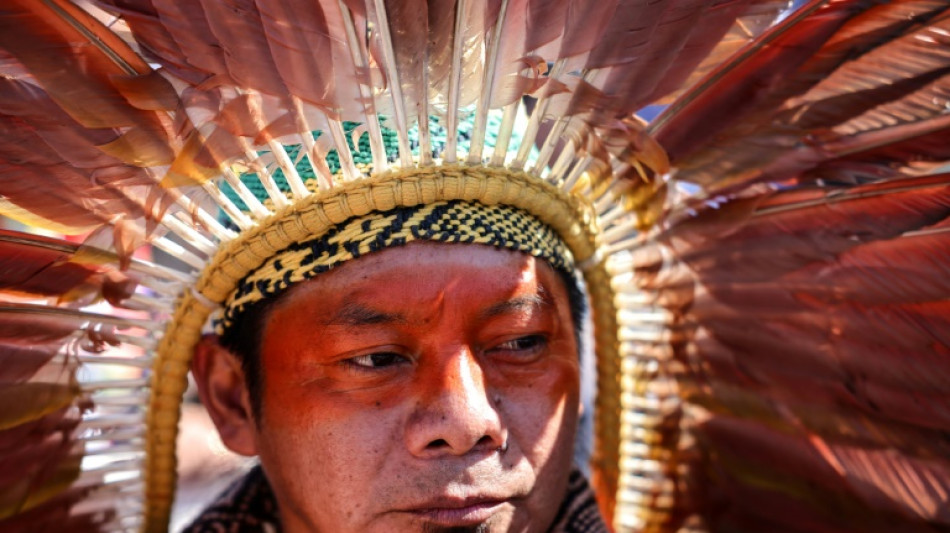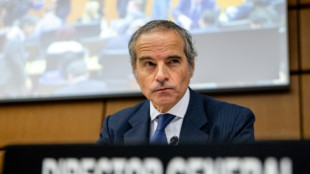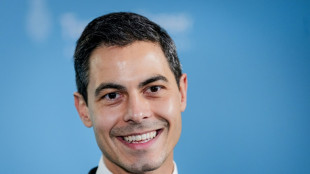
-
 Trump says Iran wants deal, US 'armada' larger than in Venezuela raid
Trump says Iran wants deal, US 'armada' larger than in Venezuela raid
-
US Justice Dept releases new batch of documents, images, videos from Epstein files

-
 Four memorable showdowns between Alcaraz and Djokovic
Four memorable showdowns between Alcaraz and Djokovic
-
Russian figure skating prodigy Valieva set for comeback -- but not at Olympics

-
 Barcelona midfielder Lopez agrees contract extension
Barcelona midfielder Lopez agrees contract extension
-
Djokovic says 'keep writing me off' after beating Sinner in late-nighter

-
 US Justice Dept releasing new batch of Epstein files
US Justice Dept releasing new batch of Epstein files
-
South Africa and Israel expel envoys in deepening feud

-
 French eyewear maker in spotlight after presidential showing
French eyewear maker in spotlight after presidential showing
-
Olympic dream 'not over', Vonn says after crash

-
 Brazil's Lula discharged after cataract surgery
Brazil's Lula discharged after cataract surgery
-
US Senate races to limit shutdown fallout as Trump-backed deal stalls

-
 'He probably would've survived': Iran targeting hospitals in crackdown
'He probably would've survived': Iran targeting hospitals in crackdown
-
Djokovic stuns Sinner to set up Australian Open final with Alcaraz

-
 Mateta omitted from Palace squad to face Forest
Mateta omitted from Palace squad to face Forest
-
Djokovic 'pushed to the limit' in stunning late-night Sinner upset

-
 Tunisia's famed blue-and-white village threatened after record rains
Tunisia's famed blue-and-white village threatened after record rains
-
Top EU official voices 'shock' at Minneapolis violence

-
 Kremlin says agreed to halt strikes on Kyiv until Sunday
Kremlin says agreed to halt strikes on Kyiv until Sunday
-
Carrick calls for calm after flying start to Man Utd reign

-
 Djokovic to meet Alcaraz in Melbourne final after five-set marathon
Djokovic to meet Alcaraz in Melbourne final after five-set marathon
-
Italian officials to testify in trial over deadly migrant shipwreck

-
 Iran says defence capabilities 'never' up for negotiation
Iran says defence capabilities 'never' up for negotiation
-
UN appeals for more support for flood-hit Mozambicans

-
 Lijnders urges Man City to pile pressure on Arsenal in title race
Lijnders urges Man City to pile pressure on Arsenal in title race
-
Fulham sign Man City winger Oscar Bobb

-
 Strasbourg's Argentine striker Panichelli sets sights on PSG, World Cup
Strasbourg's Argentine striker Panichelli sets sights on PSG, World Cup
-
Jesus 'made love': Colombian president irks Christians with steamy claim

-
 IAEA board meets over Ukraine nuclear safety concerns
IAEA board meets over Ukraine nuclear safety concerns
-
Eurozone growth beats 2025 forecasts despite Trump woes

-
 Dutch PM-elect Jetten says not yet time to talk to Putin
Dutch PM-elect Jetten says not yet time to talk to Putin
-
Social media fuels surge in UK men seeking testosterone jabs

-
 Forest face Fenerbahce, Celtic draw Stuttgart in Europa League play-offs
Forest face Fenerbahce, Celtic draw Stuttgart in Europa League play-offs
-
US speed queen Vonn crashes at Crans-Montana, one week before Olympics

-
 Trump nominates former US Fed official as next central bank chief
Trump nominates former US Fed official as next central bank chief
-
New Dutch government pledges ongoing Ukraine support

-
 Newcastle still coping with fallout from Isak exit, says Howe
Newcastle still coping with fallout from Isak exit, says Howe
-
Chad, France eye economic cooperation as they reset strained ties

-
 Real Madrid to play Benfica, PSG face Monaco in Champions League play-offs
Real Madrid to play Benfica, PSG face Monaco in Champions League play-offs
-
Everton winger Grealish set to miss rest of season in World Cup blow

-
 Trump brands Minneapolis nurse killed by federal agents an 'agitator'
Trump brands Minneapolis nurse killed by federal agents an 'agitator'
-
Arteta focuses on the positives despite Arsenal stumble

-
 Fijian Drua sign France international back Vakatawa
Fijian Drua sign France international back Vakatawa
-
Kevin Warsh, a former Fed 'hawk' now in tune with Trump

-
 Zverev rails at Alcaraz timeout in 'one of the best battles ever'
Zverev rails at Alcaraz timeout in 'one of the best battles ever'
-
Turkey leads Iran diplomatic push as Trump softens strike threat

-
 Zelensky backs energy ceasefire, Russia bombs Ukraine despite Trump intervention
Zelensky backs energy ceasefire, Russia bombs Ukraine despite Trump intervention
-
'Superman' Li Ka-shing, Hong Kong billionaire behind Panama ports deal

-
 Skiing great Lindsey Vonn crashes at Crans-Montana, one week before Olympics
Skiing great Lindsey Vonn crashes at Crans-Montana, one week before Olympics
-
Slot warns Liverpool 'can't afford mistakes' in top-four scrap

| SCS | 0.12% | 16.14 | $ | |
| BCC | -1.3% | 79.14 | $ | |
| BP | -1.42% | 37.506 | $ | |
| BTI | 0.07% | 60.25 | $ | |
| RIO | -5.82% | 89.9 | $ | |
| GSK | 1.44% | 51.395 | $ | |
| CMSC | -0.11% | 23.67 | $ | |
| BCE | 0.19% | 25.533 | $ | |
| RBGPF | 1.65% | 83.78 | $ | |
| CMSD | -0.08% | 24.04 | $ | |
| JRI | 0.27% | 12.99 | $ | |
| AZN | 0.59% | 93.14 | $ | |
| RELX | -1.73% | 35.55 | $ | |
| VOD | -0.58% | 14.625 | $ | |
| RYCEF | -2.69% | 16 | $ | |
| NGG | -0.54% | 84.59 | $ |

Amazonian chief at UN to combat traditional knowledge piracy
The leader of the Brazilian Amazon's Huni Kui people remains hopeful that a planned United Nations treaty will advance the fight against biopiracy: the pillaging of traditional knowledge and genetic resources.
However, discussions towards concluding the agreement are progressing "very slowly", Chief Ninawa told AFP on the sidelines of the treaty talks at the headquarters of the UN's World Intellectual Property Organization in Geneva.
Wearing traditional costume, Ninawa officially blessed the WIPO diplomatic conference, with music and song, during a ceremony in front of negotiators.
"Indigenous peoples have always placed their trust in the UN", he said, though he deplored that though there were "declarations and recommendations to states, things do not change" -- and the plundering of traditional knowledge continues.
But "we want to keep faith in the UN", he said.
The draft treaty being finalised at WIPO -- the UN's agency for patenting, IP and innovation -- has been in the works for more than 20 years following a first request launched by Colombia in 1999.
It would require patent applicants to disclose the country of origin of an invention's genetic resources, and whether it is based on traditional knowledge.
- Traditional medicine pirated -
"Many plants are used in traditional medicine. Companies are appropriating this knowledge to make perfumes and medicines," Ninawa said.
While natural genetic resources -- such as those found in medicinal plants, agricultural crops and animal breeds -- cannot be directly protected as intellectual property, inventions developed using them can be patented.
These resources are increasingly used by companies in everything from cosmetics to seeds, medicines, biotechnology and food supplements, and have enabled considerable progress in health, climate and food security, according to the UN.
But developing countries deplore that patents are granted without Indigenous peoples being informed, for so-called inventions that are not really new because they are based on traditional knowledge.
"As connoisseurs and protectors of this knowledge, we have much to contribute to humanity," said Ninawa.
However, "in South America and Brazil, many companies have appropriated the traditional and genetic knowledge of Indigenous peoples" without their authorisation.
The Amazonian leader said that, much to his regret, the Brazilian authorities did not consult with them -- even if President Luiz Inacio Lula da Silva "has a lot of will to change things".
"But it does not depend only on President Lula," he said.
- Ayahuasca brew -
Ninawa cited ayahuasca as a case in point.
A psychoactive brew prepared from vines by the people of the western Amazon basin, ayahuasca is seen, depending on the version, as a miracle cure, a tool for inner exploration and personal development, a recreational hallucinogen, or a dangerous psychotropic drug.
In certain countries, psychedelic tourism has developed around ayahuasca, which can also be bought online, in capsules or as an infusion.
"There are a lot of laboratories that want to do research (on ayahuasca) to treat people with psychological or mental problems," said Ninawa.
The community he leads, comprising 17,000 people in Brazil and 4,000 in Peru, feels in danger from biopiracy.
"The way they enter our community, in search of traditional and ancestral knowledge, represents a very real, very strong threat," he said.
The battle against biopiracy could reach a turning point if WIPO's more than 190 member states manage to conclude an agreement. The talks in Geneva are scheduled to last until May 24.
"We came here to bring a declaration from the Indigenous peoples of Brazil, to highlight the problems that the appropriation of our knowledge causes for our communities," explained the Huni Kui leader.
This knowledge "is part of our spirituality, it is not resources for the economy".
"It is very important that governments and leaders know: our relationship with Mother Nature is not economic but a way of being in a relationship with life."
A.Ammann--VB



